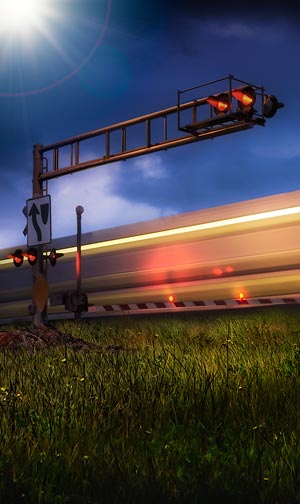Louisiana Parish Employee Injured at Dangerous, Unguarded BNSF Crossing
(Welsh, Louisiana – May 2, 2016)
Barely two and a half months since one woman was killed and another seriously injured in a collision with a train a Jefferson Davis Parish Police Jury employee operating a backhoe across the same road/rail intersection has been seriously injured. The most recent incident took place at the dangerous and unguarded crossing of Oilfield Road and BNSF railroad tracks near Welsh, LA.
The as-yet unidentified man was preparing to cross the single-track, significantly brush and tree-obscured and unguarded crossing at about 1:20 P.M., CDT Monday afternoon when the front end of his backhoe was impacted by a westbound train. The train was one of a daily average of 18 BNSF, Union Pacific and Amtrak trains that traverse the crossing at a maximum allowable speed of 70 mph. The driver was taken to a local hospital for treatment of his undisclosed injuries.
The accident at the location where an Associated Press story said “The railroad crossing does not have crossing arms, but is marked by railroad crossing signs and stop signs” has now been the site of six collisions between trains and highway vehicles, mishaps which have resulted in two deaths and six non-fatal injuries, including Monday’s.
The most recent accident occurred on February 16 of this year when an Iowa, LA woman was killed and another was seriously injured in a collision with a train. Another fatality was suffered there in 1989. Yet, even after these tragedies, the crossing still lacks any form of active warning devices, such as lights and gates. It is virtually certain that if this crossing was equipped with lights and gates, this collision and the six before it would not have happened. Both BNSF and Operation Lifesaver all know that lights and gates are the most effective type of protection at railroad crossings. Studies that have been conducted over fifty years ago confirm that lights and gates offer the ability to drastically reduce the number of vehicle/train accidents by as much as 96%.


